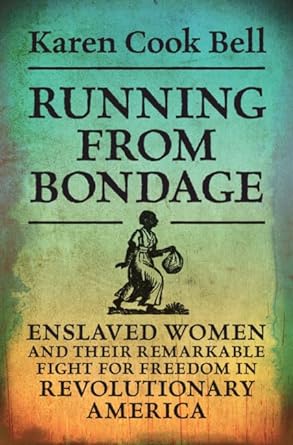The Book
Channeling the State: Community Media and Popular Politics in Venezuela
The Author(s)
Naomi Schiller

Karen Cook Bell’s study of slave resistance in eighteenth-century America focuses on the stories of enslaved women who fled bondage during and after the American Revolution. During this period, one third of runaways were women, yet Bell argues that scholars have overlooked the lives of fugitive women. Running from Bondage attempts to the address this gap by exploring the gendered dimensions of efforts to flee slavery. Moreover, Bell highlights the contributions of Black women to abolitionism. In five chapters, Bell explores labor, Black women’s ideas about freedom that emerged in dynamic tension with the American Revolution, tactics of flight and strategies to win freedom, and efforts to establish maroon communities.
The challenge of Bell’s undertaking is clear: there is very little documentation of enslaved women’s experiences of fugitivity in the archive, which Bell describes as the “violence of archival silence.”[1] Bell draws largely on runaway slave advertisements, which were a prominent feature of print culture during the period of slavery. The author supplements these with official correspondences, trial records, diaries, plantation records and petitions, as well as existing scholarship, to provide as detailed as possible a portrayal of the lives of fugitive enslaved women.
Bell explores the specificities of the labor performed by enslaved women revealing their critical economic contributions and gendered exploitation. She underscores how “the intersection of women’s productive and reproductive capabilities, and the exploitation of both, shaped their experience of slavery and informed their resistance.”[2] Bell highlights the brutal impacts of slavery on the bodies of women, revealing both the impacts of an unrelenting labor regime, forced reproduction, and the violence through which bondage was enforced. At times Cook draws broad conclusions about the aspirations and beliefs of enslaved women that are sparingly substantiated by the evidence she provides. Chapter Five, for example, provides a fascinating look at maroon communities in Georgia, Florida, and the Gulf Coast, but given the sources available, Bell’s effort falls short in providing insight into the specificities of Black women’s lives in fugitive enclaves.
Running from Bondage celebrates the importance of Black women’s contributions to fighting for freedom for themselves and their children through everyday acts of disguise, trickery, and intricate planning, as well as through legal means. Bell’s central argument that fleeing bondage “represented a central expression of human agency”[3] merits more exploration than the author devotes. To go beyond the “agency as argument” conundrum,[4] Cook might have pushed farther, for example, with her analysis of Margaret, a twenty-one-year-old woman living in Baltimore who escaped bondage dressed as a man. Bell considers how the lives of enslaved women like Margaret “were shaped by sexual violence and impossible choices, which are not fully elucidated by progressive notions of agency.”[5] Yet she devotes little critical attention to important debates about how notions of agency are steeped in a world view shaped by patriarchal white supremacy. After minimal engagement, she dismisses Walter Johnson’s trenchant critique of the concept of agency, missing an opportunity to delve deeper into the potential traps that the concept smuggles with it, including the assumption of a liberal notion of individuated subjectivity that was formed in relationship to enslaved people.[6]
Running From Bondage shines in its vivid recounting of the conditions that enslaved women faced and their efforts to free themselves and their children.
[1] Karen Cook Bell. Running from Bondage: Enslaved Women and Their Remarkable Fight for Freedom in Revolutionary (Cambridge: Cambridge University Press, 2021), 140.
[2] Bell, Running from Bondage, 43.
[3] Bell, Running from Bondage, 4.
[4] Lynn M. Thomas, “Historicising Agency,” Gender and History 28, no. 2 (August 2016), 327.
[5] Bell, Running from Bondage, 61.
[6] Walter Johnson, “On Agency” Journal of Social History, 37, No. 1, (Autumn, 2003), 113-124.
About the Reviewer
Naomi Schiller is an Associate Professor of Anthropology at Brooklyn College and The Graduate Center, CUNY. She is author of Channeling the State: Community Media and Popular Politics in Venezuela (Duke University Press, 2018).

0